#space colonization
Explore tagged Tumblr posts
Text
Kelly and Zach Weinersmith’s “A City On Mars”
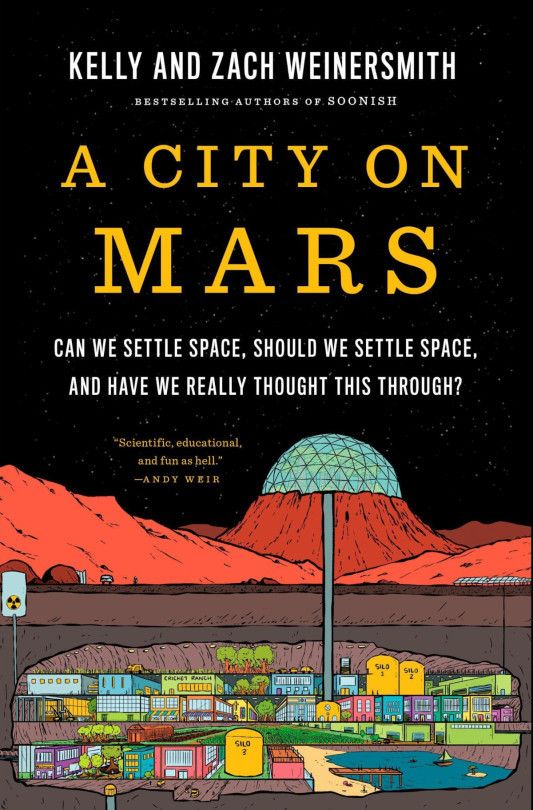
In A City On Mars, biologist Kelly Weinersmith and cartoonist Zach Weinersmith set out to investigate the governance challenges of the impending space settlements they were told were just over the horizon. Instead, they discovered that humans aren't going to be settling space for a very long time, and so they wrote a book about that instead:
https://www.acityonmars.com/
The Weinersmiths make the (convincing) case that ever aspect of space settlement is vastly beyond our current or reasonably foreseeable technical capability. What's more, every argument in favor of pursuing space settlement is errant nonsense. And finally: all the energy we are putting into space settlement actually holds back real space science, which offers numerous benefits to our species and planet (and is just darned cool).
Every place we might settle in space – giant rotating rings, the Moon, Mars – is vastly more hostile than Earth. Not just more hostile than Earth as it stands today – the most degraded, climate-wracked, nuke-blasted Earth you can imagine is a paradise of habitability compared to anything else. Mars is covered in poison and the sky disappears under planet-sized storms that go on and on. The Moon is covered in black-lung-causing, razor-sharp, electrostatically charged dust. Everything is radioactive. There's virtually no water. There are temperature swings of hundreds of degrees every couple of hours or weeks. You're completely out of range of resupply, emergency help, or, you know, air.
There's Helium 3 on the Moon, but not much of it, and there is no universe in which is it cheaper to mine for Helium 3 on the Moon than it is to mine for it on Earth. That's generally true of anything we might bring back from space, up to and including continent-sized chunks of asteroid platinum.
Going to space doesn't end war. The countries that have gone to space are among the most militarily belligerent in human history. The people who've been to space have come back perfectly prepared to wage war.
Going to space won't save us from the climate emergency. The unimaginably vast trove of material and the energy and advanced technology needed to lift it off Earth and get it to Mars is orders of magnitude more material and energy than we would need to resolve the actual climate emergency here.
We aren't anywhere near being a "multiplanetary species." The number of humans you need in a colony to establish a new population is hard to estimate, but it's very large. Larger than we can foreseeably establish on the Moon, on Mars, or on a space-station. But even if we could establish such a colony, there's little evidence that it could sustain itself – not only are we a very, very long way off from such a population being able to satisfy its material needs off-planet, but we have little reason to believe that children could gestate, be born, and grow to adulthood off-planet.
To top it all off, there's space law – the inciting subject matter for this excellent book. There's a lot of space law, and while there are some areas of ambiguity, the claims of would-be space entrepreneurs about how their plans are permissible under the settled parts of space law don't hold up. But those claims are robust compared to claims that space law will simply sublimate into its constituent molecules when exposed to the reality of space travel, space settlement, and (most importantly) space extraction.
Space law doesn't exist in a vacuum (rimshot). It is parallel to – and shares history with – laws regarding Antarctica, the ocean's surface, and the ocean's floor. These laws relate to territories that are both vastly easier to access and far more densely populated by valuable natural resources. The fact that they remain operative in the face of economic imperatives demands that space settlement advocates offer a more convincing account than "money talks, bullshit walks, space law is toast the minute we land on a $14 quadrillion platinum asteroid."
The Weinersmiths have such an account in defense of space law: namely, that space law, and its terrestrial analogs, constitute a durable means of resolving conflicts that would otherwise give rise to outcomes that are far worse for science, entrepreneurship, human thriving or nation-building than the impediments these laws represent.
What's more, space law is enforceable. Not only would any space settlement be terribly, urgently dependent on support from Earth for the long-foreseeable future, but every asteroid miner, Lunar He3 exporter and Martian potato-farmer hoping to monetize their products would have an enforcement nexus with a terrestrial nation and thus the courts of that nation.
But the Weinersmiths aren't anti-space. They aren't even anti-space-settlement. Rather, they argue that the path to space-based scientific breakthroughs, exploration of our solar system, and a deeper understanding of our moral standing in a vast universe cannot start with space settlements.
Landing people on the Moon or Mars any time soon is a stunt – a very, very expensive stunt. These boondoggles aren't just terribly risky (though they are – people who attempt space settlement are very likely to die horribly and after not very long), they come with price-tags that would pay for meaningful space science. For the price of a crewed return trip to Mars, you could put multiple robots onto every significant object in our solar system, and pilot an appreciable fleet of these robot explorers back to Earth with samples.
For the cost of a tiny, fraught, lethal Moon-base, we could create hundreds of experiments in creating efficient, long-term, closed biospheres for human life.
That's the crux of the Weinersmiths' argument: if you want to establish space settlements, you need to do a bunch of other stuff first, like figure out life-support, learn more about our celestial neighbors, and vastly improve our robotics. If you want to create stable space-settlements, you'll need to create robust governance systems – space law that you can count on, rather than space law that you plan on shoving out the airlock. If you want humans to reproduce in space – a necessary precondition for a space settlement that lasts more than a single human lifespan – then we need to do things like breed multiple generations of rodents and other animals, on space stations.
Space is amazing. Space science is amazing. Crewed scientific space missions are amazing. But space isn't amazing because it offers a "Plan B" for an Earth that is imperiled by humanity's recklessness. Space isn't amazing because it offers unparalleled material wealth, or unlimited energy, or a chance to live without laws or governance. It's not amazing because it will end war by mixing the sensawunda of the "Pale Blue Dot" with the lebensraum of an infinite universe.
A science-driven approach to space offers many dividends for our species and planet. If we can figure out how to extract resources as dispersed as Lunar He3 or asteroid ice, we'll have solved problems like extracting tons of gold from the ocean or conflict minerals from landfill sites, these being several orders of magnitude more resource-dense than space. If we can figure out how to create self-sustaining terraria for large human populations in the radiation-, heat- and cold-blasted environs of space, we will have learned vital things about our own planet's ecosystems. If we can build the robots that are necessary for supporting a space society, we will have learned how to build robots that take up the most dangerous and unpleasant tasks that human workers perform on Earth today.
In other words, it's not just that we should solve Earth's problems before attempting space settlement – it's that we can't settle space until we figure out the solutions to Earth's problems. Earth's problems are far simpler than the problems of space settlement.
As I read the Weinersmiths' critique of space settlement, I kept thinking of the pointless AI debates I keep getting dragged into. Arguments for space settlement that turn on existential risks (like humanity being wiped out by comets, sunspots, nuclear armageddon or climate collapse) sound an awful lot like the arguments about "AI safety" – the "risk" that the plausible sentence generator is on the verge of becoming conscious and turning us all into paperclips.
Both arguments are part of a sales-pitch for investment in commercial ventures that have no plausible commercial case, but whose backers are hoping to get rich anyway, and are (often) sincerely besotted with their own fantasies:
https://locusmag.com/2023/12/commentary-cory-doctorow-what-kind-of-bubble-is-ai/
Both AI and space settlement pass over the real risks, such as the climate consequences of their deployment, or the labor conditions associated with their production. After all, when you're heading off existential risk, you don't stop to worry about some carbon emissions or wage theft.
And critically, both ignore the useful (but resolutely noncommercial) ways that AI or space science can benefit our species. AI radiology analysis might be useful as an adjunct to human radiological analysis, but that is more expensive, not less. Space science might help us learn to use our materials more efficiently on Earth, and that will come long before anyone makes rendezvous with a $14 quadrillion platinum asteroid.
There are beneficial uses for LLMs. When the Human Rights Data Analysis Group uses an LLM to help the Innocence Project New Orleans extract and categorize officer information from wrongful conviction records, they are doing something valuable and important:
https://hrdag.org/tech-notes/large-language-models-IPNO.html
It's socially important work, a form of automation that is an unalloyed good, but you won't hear about it from LLM advocates. No one is gonna get rich on improving the efficiency of overturning wrongful convictions with natural language processing. You can't inflate a stock bubble with the Innocence Project.
By the same token, learning about improving gestational health by breeding multigenerational mouse families in geosynchronous orbit is no way to get a billionaire tech baron to commit $250 billion to space science. But that's not an argument against emphasizing real science that really benefits our whole species. It's an argument for taking away capital allocation authority from tech billionaires.
I'm a science fiction writer. I love stories about space. But I can distinguish fantasy from reality and thought experiments from suggestions. Kim Stanley Robinson's 2015 novel Aurora – about failed space settlement – is every bit as fascinating and inspirational as "golden age" sf:
https://memex.craphound.com/2015/11/02/kim-stanley-robinsons-aurora-space-is-bigger-than-you-think/
But still, it inspired howls of outrage from would-be space colonists. So much so that Stan wrote a brilliant essay explaining what we were all missing about space settlement, which I published:
https://boingboing.net/2015/11/16/our-generation-ships-will-sink.html
With City on Mars, the Weinersmiths aren't making the case for giving up on space, nor are they trying to strip space of its romance and excitement. They're trying to get us to focus on the beneficial, exciting, serious space science we can do right now, not just because it's attainable and useful – but because it is a necessary precondition for any actual space settlement in the distant future.

If you'd like an essay-formatted version of this post to read or share, here's a link to it on pluralistic.net, my surveillance-free, ad-free, tracker-free blog:
https://pluralistic.net/2024/01/09/astrobezzle/#send-robots-instead
#pluralistic#books#reviews#space#bezzles#mars#spacex#robots#science#space science#space travel#space settlement#space colonization
1K notes
·
View notes
Text
Let’s talk about the Creepers perspective.
For who knows how long, the Creepers have been the (seemingly) apex life form on Nifilheim, if not the only life form.
For no doubt countless generations, these creatures have lived in harmony with the natural environment of Nifilheim before the colonizers showed up.
And, upon first encounter with one of these colonizers, the mother Creeper elects to save him, no ulterior motive evident.
She simply chose to save him, not main, eat, or kill him.
For who knows how long the Creepers have (seemingly) been the only sentient life on this planet and their first choice upon encountering a new species is to save one of them with no nefarious motive.
So, no doubt, upon feeling the death of her child (I’m assuming they work as a bit of a hive mind or are connected telepathically), she was shocked. They’ve probably never experienced one of them dying in such a manner of malicious intent.
What did the mother Creeper feel? The pain of her child, confusion that these beings have invaded her home, changing it, and, after she saves one of them, they kill her child in return.
The utter devastation that must have inflicted upon the entire species of the Creepers.
With the mother’s negotiations, I’m not sure if she was even truly sure of demanding a death, or that it would truly be carried out.
She looked shocked after Mickey 18 blew himself and Marshall up, shocked that this species whom had betrayed her had still made things right by her demands.
We see later the explosion of the mind was all a ploy, no doubt she’d never encountered another hostile species before, so we have no way of knowing what she would’ve done if denied.
Perhaps she’d have torn the ship apart, but either way she saw that even though some of the humans killed her child, others were willing to set things right by her demands.
I don’t know about y’all but I just think it’s interesting to think of this isolated species and their reaction to this and how it no doubt parallels the real world with the effects of colonization.
136 notes
·
View notes
Text
You've been on a generational ship your entire life. There's about a million people on the ship, the population doesn't grow or shrink at all. Your entire life is and will be defined by a limited amount of room, a small space, barely large enough for everyone there to fit, that has become your entire world.
The humans that exist on generational ships are very alien to the humans that exist on planets. Your job is to maintain the ship and carry the culture of humanity but you don't need a human lifestyle to do it. Because reproduction needs to be done through artificial wombs all humans are neutered, with sterile sexless bodies. Everyone's job is determined by ship authority, and very dark things happen to those not able to perform some sort of duty. People spend the first fifteen years of their lives in virtual reality, learning about humanity in a simulation until they're ready to live as adults. Everything is so alien from the earth that you read about in books.
It wouldn't be so hard if society wasn't meant to resemble earth, meant to resemble the most conservative and traditional of earth. The American flags hanging up on the walls, despite everyone alive on board having never known America. The way the pods you live in have astroterf lawns, and fake blue skies painted above them, and the facades of American suburban homes. The way resources a distributed from things meant to look like family run stores, despite the monolithic power behind the economy. Even as monolithic as station authority is it still must dress as democracy, and must preach capitalism in a world with no markets, and patriotism in a world with no nations.
Despite your sexless body you're not free of performing gender. You wear dresses over your breastless neutered body, are expected to act feminine, to carry gender rolls into the planet you're going to. Your husband is expected to do the same for maleness. You love him but your situation feels like a performance with no audience. Despite having neither the instinctual desire nor the physical apparatus to you try to be physically intimate with him, it's what everyone does with their spouse, it would be weird not to.
Space isn't as empty as earth thought it would be. There are things that lurk in the void between stars. Nobody fully knows what they are, where they come from, even if they all come from the same place. Sometimes they put the ship in danger, sometimes the authorities make deals with them. But nobody is allowed to know. You're just all told to be afraid of them but not understand why you have to be afraid. The nightmares between stars aren't delt with with knowledge but with ignorance, they do seem creepy from the little you've seen of them but everyone kind of knows their power is being used for something by the station. Patriotism is always helped by having monsters beyond your borders.
Your entire you've dreamed of blue skies and stars and fields and forests and oceans and all those pretty things you've never seen, that you never will see. People always dream of being so high ranking they'll have access to suspended animation and life extension technology, but so few ever reach that rank. You've read all the classics they allow, read Dante, and Milton, and Homer, tried to let poetry bring you to earth but that planet is alien to you now. Sometimes you wonder what it would be like if you weren't raised in a world that copied earth, if you were accepted as a member of a race that lives on a ship, that exists so liminally. Would there still be such a longing. Mabye you shouldn't have been expected to meet a standard from another world. Mabye you weren't born to long for anything. Does it scare you to think you wouldn't want earth if they didn't tell you to?
#196#my thougts#worldbuilding#writing#my writing#my worldbuilding#leftist#leftism#science fantasy#science fiction#sci fi#scifi#space#original fiction#flash fiction#short fiction#short story#anticapitalism#anti capitalism#dystopia#cyberpunk#space colonization#spaceship#space exploration#scifi writing#scifi worldbuilding#queer#gender theory#anti capitalist#anticapitalista
140 notes
·
View notes
Text
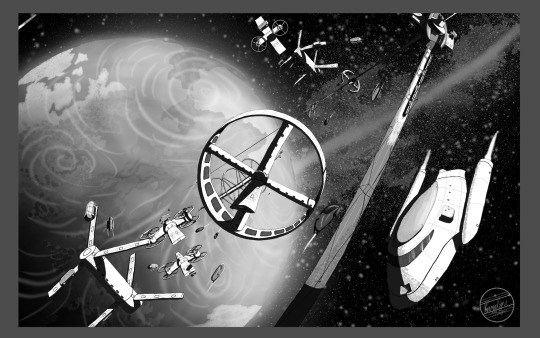
Metropolis.
Originally completed on 17th June 2021.
My interpretation: High above a colony planet in the distant future orbits the infrastructure and habitats of progress. A space elevator rises up through a space station and is counterbalanced by a maglev track that circles the planet like its own ring. Various space stations and crafts sit alongside it, acting as stops for the train service in this grand metropolis.
#artists on tumblr#clip studio paint#colour blindness#digital art#digital illustration#digital painting#illustration#my art#digital drawing#art#scifiart#scifi#space#future#space colonization#planet#metropolis#city#cityscape#space station#space elevator#spaceship#maglev#orbit#orbital#black and white#stars#greyscale#black & white art#original art
13 notes
·
View notes
Text
Neither Elon Musk Nor Anybody Else Will Ever Colonize Mars

"In a saner society, a rich guy with Musk's well-known and unapologetically expounded views would sooner find himself under a guillotine than atop a space agency with the power to dragoon the world's resources into his k-hole John Galt cosplay.
"The certainty that he will never make another planet habitable is no comfort to the rest of us, when in the act of trying he may do the opposite to this one. The doomsday scenario is coming from inside the house. I hope he dies on Mars."
my only quibbles: don't penguins reproduce in Antarctica? so do a number of aquatic creatures living beneath the ice shelves
also, "ever" is a very long time. life on Mars could be shielded from radiation by a (very) technologically advanced society capable of building forcefield-generating satellites... sometime around when we become a Type 2 Kardashev-Scale Civilization capable of capturing most of our Sun's energy. when's that? hint: nowhere within Musk's lifetime
otherwise, a brilliant take-down of Musk's plan to colonize Mars (and drain Earth's resources), from The Defector: X
#Mars#Earth#biosphere#space colonization#Kardashev Scale#John Galt cosplay#elongated muskrat#my screencaps
42 notes
·
View notes
Text
The rulers treat their land so poor
Because they want to flee—
The planet earth is all played out—
Isn’t that reality?
#writers on tumblr#politics#us elections#election 2024#creative writing#socialism#communism#kamala walz#writerblr#elon musk#original poem#poetry#short peoms#sad poem#activism#climate change#climate crisis#fuck trump#donald trump#trump#space travel#space exploration#si fi#space colonization#mars colonization#anti colonization#power#reality shifting#harsh truths#earth
21 notes
·
View notes
Note
So an entire organism was genetically engineered to provide draft labor to space colonists instead of... using a robot? Or some kinda technology? Why did they even bother to prepare for logging on an alien planet? Were they still building things from wood in the year forty million before the collapse of civilization or losing contact with the other colonies or whatever the grobusverse apocalypse was?
Don't get me wrong, I love the idea of alien planet logging but I'm curious as to the logic behind it. Are people colonizing alien planets simply to start over from an agricultural base? Don't they bring heavy industry with them?
REDUNDANCY, brother- redundancy! Man cannot survive on vats of yeast and robot labor alone...
These planets were indeed being settled by people with vast resources and hi tech, but a large contingency of the people leaving the "civilized" world were also doing so to lead less far-future-ie urbanized lives. In this setting, there are also a lot of religious settlers who would also prefer to live outside of the intergalactic supply chain. Griz Grobus actually closes out with a little pamphlet that touches on some of these themes, which i'll attach below:


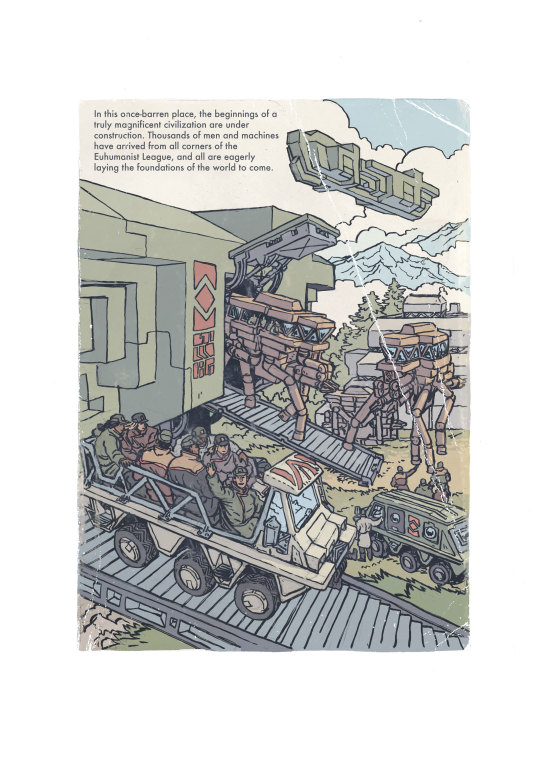
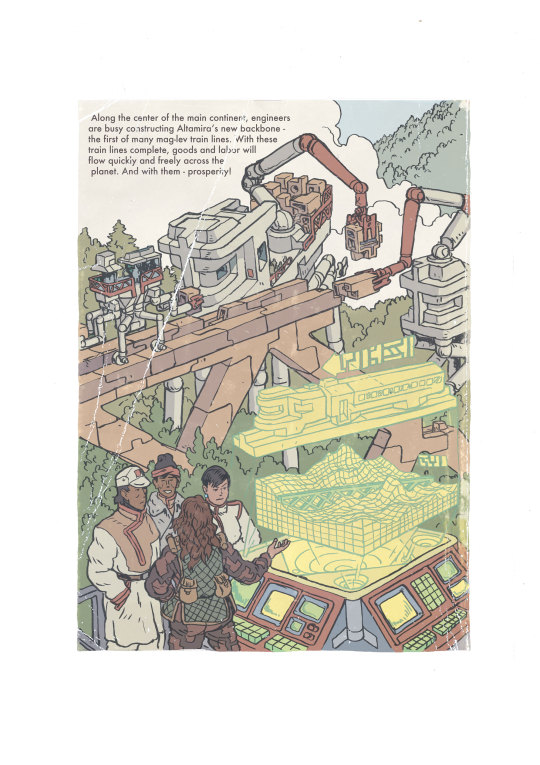


Which is to say that these planets are settled both by future space communists and back-to-the-land space mormon types, and everyone in between. After the grobus-pocalypse, the tools brought by those space mormon types just ended up doing much much more of the heavy lifting...
60 notes
·
View notes
Text
What do you think is the more interesting kind of worldbuilding for space opera:
Warhammer 40,000 and Star Trek, where Earth is humanity’s capital and sacred homeland
Dune and Legend of the Galactic Heroes, where people know humans are from Earth, but it doesn’t get any special privileges in the galaxy from that, not any more than Africa does on modern Earth
Foundation and The Culture, where Earth is just another planet and nobody thinks it’s special at all
Firefly and Titan A.E., where Earth was dramatically lost
Or Star Wars and L-Gaim, where humanity’s homeworld is forgotten and irrelevant?

#space opera#sci-fi#worldbuilding#lore#backstory#earth#terra#tellus#galaxy far far away#galactic empire#space colonization#future humanity
11 notes
·
View notes
Text
we were born to inherit the stars

lowkey space colonialism is such an interesting concept, when executed well it can really showcase the true selfish nature of humanity. this idea popped into my mind and i decided to just make it a reality
8 notes
·
View notes
Text
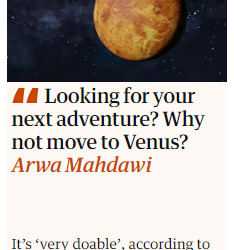
I don't see any reason not to trust him with this
126 notes
·
View notes
Text
[head in hands]
the problem with colonizing space re: environmental issues is literally a conversation about if microbe level life-- should it exist-- should be protected and studied before we fuck it up by rubbing earth germs into it.
at which point it turns into a "there's a lot of fuckin' rocks out here that DON'T have life goo on them to study" thing.
At worst you throw off mass of a body and alter its trajectory because you're constantly fucking touching it to get on and off it/taking away material. But if you're a mining company with enough shit together to fuck with space, you damn well can afford at LEAST one coffee fed nerdlord with a calculator to plot out where shits gonna land.
And this isn't me doing the "all life is precious so we should never walk on grass etc" thing. It's literally a case of there being immense scientific value in knowing what the fuck happened over there to make life happen in a similar way to over here. Or if its wildly different.
Basically the issues with space mining are like. logistics and environmental surveys. which. is a terrestrial problem too.
the ethical concerns depend on like. what framework you're using. What you're centering. Are we centering life in general, humanity, profit, or preserving the idea of a very literally untouched realm. Does setting up shop on mars hurt other humans? Only in so far as there's probably going to be class shit happening on mars too. Does that have potential for environmental harm that could be avoided if done carefully? Yeah.
Its a lot of it depends.
I'm just throwing in my 2 cents because i've seen like 6 posts of various levels of wild takes on this and they're all kinda a little off the point it feels like they're trying to make
7 notes
·
View notes
Text

April 27, 2025:
Um ok first of all the cover art does not match the vibe of this story. It is spooky to look at, but I don't think it supports what's really going on here.
The concept is really cool: a planet with its own "self-cleaning" mechanism which is a scary goo that dissolves living things discriminately. A climate scientist whose entire job it is to make sure the human colonies don't get put on that "to clean" list. A toxic marriage, acute enforced heterosexuality, several more toxic marriages... It's a lot of stuff packed into a short novella.
The concepts are there, but the execution wasn't my favorite? It said what it wanted to say and that's fine.
6.5/10 #WhatsKenyaReading
#whatskenyareading#books#reading#library#sci-fi#sci fi#science fiction#cli fi#climate fiction#goo#gelatinous cube#toxic relationship#toxic yuri#lesbian#sapphic#wlw#lgbtq+#queer#lgbtqia#lgbtq#heterosexuality#compulsory heterosexuality#climate crisis#environment#planet#extermination#science#scientist#space exploration#space colonization
3 notes
·
View notes
Text
I’m all for uniting humanity as much as the next guy, but this whole “we were born to inherit the stars” thing is lowkey giving space fascism
#let’s all practice safe space colonialism#colonize the stars but make it inclusive#speciesism = cringe#cosmopolitanism#panhumanism#outer space#futurism#space colonization#humanity#philosophy
5 notes
·
View notes
Text
Somewhere out on the very edge of human space there's a human planet whose religion completely rejects the material world. They believe the god that created the humans soul and the god that created the mortal body are in constant struggle. They see all matters of the flesh, from sex, to gluttony, to even the joy of sleep to be sinful and try to keep it to a minimal. They've cut contact with almost every other human world due to this holy war.
Over time their culture saw artifical beauty as more and more important. Their people wore complex clothing, and unnatural makeup, and jewelry, to try to separate themselves from the mortal form. Their architectural types became geometric and unnatural, and their art attempted to depict the perfection of mathematic and scientific truth more then it did the beauty of nature and humanity. Though still, they were limited then by technology.
Though as technology advanced they became more and more obsessed with cybernetics. They began to see the best way to transcend the flesh to be to destroy it. They began to make themselves less and less human physically. Rituals began where they'd mutilate their bodies publicly, and then heal themselves through cybernetics. The sense themselves were upgraded, going from the flawed and subjective biological senses, to perfectly accurate mechanical ones, eyes that saw all colors, and ears that heard all sound, and cold hard bodies that would never feel comfort.
Within a few generations they were entirely mechanical. Their bodies were completely doll like and mechanical, hard shells with visible joints hiding blood and bone underneath, and then not even blood and bone was in their bodies. Unable to sexually reproduce they made more of themselves in factories, creatures that would never know flesh.
When human ships come to that world nowadays they don't even register it as a human planet, just a strange machine world inhabited by doll like robots. Few humans come anyway, their religion has long since rejected the idea that anyone who was ever biological can join, and they're starting to convert other robot worlds. Soon most of their population won't even remember the fleshy times, the times before they made themselves "perfect".
#196#my thougts#worldbuilding#writing#my worldbuilding#my writing#gnosticism#robots#robot#cyborgs#cyborg#cyberpunk#cybercore#androids#android#scifi#science fiction#science fantasy#sci fi#scifi writing#scifi worldbuilding#science fiction writing#science fiction worldbuilding#far future#space colonization#religion#original fiction#flash fiction#short story#short fiction
121 notes
·
View notes
Text

Descendant of colonizers issues emotional threat to disassemble every brick of his house and eat them one by one before allowing land redistribution
#class war#anti colonialism#anti colonization#colonialism#africa#south africa#usa#america#usa is a terrorist state#usa is funding genocide#colonial era#colonial history#colonial america#fuck colonizers#european colonization#mars colonization#space colonization#ausgov#politas#auspol#tasgov#taspol#australia#fuck neoliberals#neoliberal capitalism#anthony albanese#albanese government#colonial india#anticolonial#anti imperialism
3 notes
·
View notes
Text
Mars and beyond: Humanity's future on the Red Planet 🌕✨
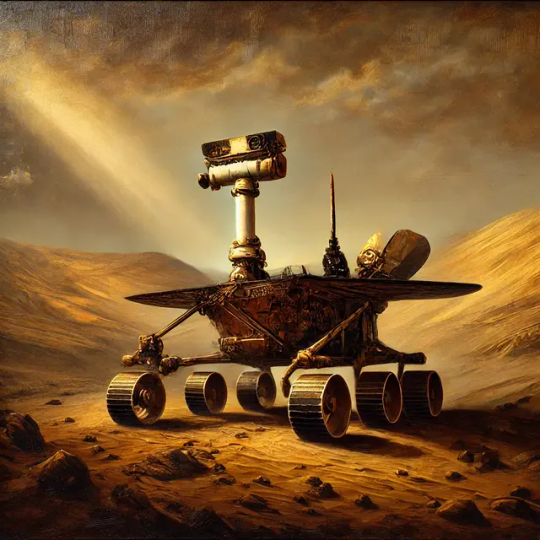


Several days ago, I looked at the night sky and saw Venus and Mars, I used a small telescope that I borrowed from a friend. It was a mesmerizing moment. I love space and am fascinated by it. My night of exploration made me think about our future if we could colonize planets like Mars and how long that might take.
I've read many scientific articles and pieces about humans in space. Our world never stops evolving and technologies improve every day. Perhaps, in the near future, we'll see the first humans on Mars. What once seamed unattainable is now being worked on by hundreds of scientists. No one can afford a mistake as this dream slowly becomes reality.
Just look at Voyager, launched over 50 years ago and still sending back data. Now, our technology is advancing rapidly and becoming more and more fantastic.
So, do you believe in humanity's future on Mars? ☄️🌌🪐
.
#mars#mars exploration#space#space travel#humans#humans and aliens#humans on mars#future#future of humanity#space colonization#life on mars#science#science fiction#science of reality#mars mission#technology#exploring the univers#the universe
9 notes
·
View notes